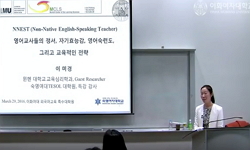본 연구의 목적은 마이크로티칭을 활용한 음악수업 시연에 따른 예비 초등교사들의 자기효 능감의 변화와 이러한 변화에 영향을 미친 요인을 탐색하는 데 있다. 이를 위해 A 교육대학 교의 ...
http://chineseinput.net/에서 pinyin(병음)방식으로 중국어를 변환할 수 있습니다.
변환된 중국어를 복사하여 사용하시면 됩니다.
- 中文 을 입력하시려면 zhongwen을 입력하시고 space를누르시면됩니다.
- 北京 을 입력하시려면 beijing을 입력하시고 space를 누르시면 됩니다.

마이크로티칭을 활용한 음악수업 시연에 따른 예비 초등교사의 자기효능감 변화 탐색 = Exploring the Change of Self-efficacy of Pre-service Elementary School Teachers Using Microteaching in Music Subject
한글로보기부가정보
국문 초록 (Abstract)
본 연구의 목적은 마이크로티칭을 활용한 음악수업 시연에 따른 예비 초등교사들의 자기효 능감의 변화와 이러한 변화에 영향을 미친 요인을 탐색하는 데 있다. 이를 위해 A 교육대학 교의 음악교육 심화 과정 3학년에 재학 중인 예비교사 24명을 대상으로 마이크로티칭 전후에 자기효능감 검사를 실시하였으며, 자기효능감의 긍정적인 변화를 보인 상위 10명의 성찰 저 널과 인터뷰 자료를 수집하여 분석하였다. 분석 결과는 다음과 같다. 첫째, 마이크로티칭을 활용한 음악 수업 시연은 예비 초등교사의 자기효능감 향상에 긍정적인 효과가 있었다. 둘째, 마이크로티칭을 활용한 음악 수업 시연이 예비 초등교사의 자기효능감 향상에 긍정적인 효과 를 미친 요인은 ‘실제적 음악수업의 실행’, ‘수업 관찰을 통한 성찰’, ‘건설적인 피드백과 평가 의 제공’, ‘수업시연 불안의 극복’의 네 가지로 범주화되었다.
다국어 초록 (Multilingual Abstract)
The purpose of this study was to explore the changes of self-efficacy of pre-service elementary school teachers using microteaching in music subject and the factors that influenced these changes. To this end, twenty four juniors majoring music educati...
The purpose of this study was to explore the changes of self-efficacy of pre-service elementary school teachers using microteaching in music subject and the factors that influenced these changes. To this end, twenty four juniors majoring music education at A University of Education were participated and tested for self-efficacy before and after microteaching. Additionally, reflective journals and interview data from the top 10 participants who showed positive changes in self-efficacy were collected and analyzed. The analysis yielded the following results. First, music teaching using microteaching had a positive effect on improving self-efficacy of pre-service elementary school teachers. Second, the factors contributing to the improvement in self-efficacy resulting from music teaching using microteaching were categorized into four themes: ‘actual execution of music lessons’, ‘reflection through video observation’, ‘constructive feedback and evaluation’, and ‘overcoming anxiety in music teaching’. The pre-service elementary school teachers were able to recall music teaching and learning contents and methods they had learned in lectures while they wrote music lesson plans, and had the opportunity to apply and modify these contents and methods through microteaching. By observing the music lesson plans and video-taped microteaching of peers, they were able to reflect on their own lessons to see which aspects of the lessons were effective for music teaching and learning and which aspects needed to be revised and made up for. In addition, the pre-service teachers can recognize the focus or problems of the lesson through feedback from the instructor and modify it during the preparation of lesson and microteaching, and after microteaching, they can be evaluated from peers on the positive aspects and areas for improvement of the lesson. Repeated microteaching made the teachers gain confidence through successful experience of implementing lessons and modeling by peer teachers, and the increased confidence helped to enhance their self-efficacy.
동일학술지(권/호) 다른 논문
-
공감 향상을 위한 전통 연희의 교육적 활용 : 남사당놀이 중 ‘덜미’를 중심으로
- 미래음악교육학회
- 박선영
- 2024
- KCI등재
-
예비음악교사의 다문화 역량 강화를 위한 교재분석 및 시사점 도출: ‘음악교육론’을 중심으로
- 미래음악교육학회
- 정재은
- 2024
- KCI등재
-
음악교과 관점에서 본 현행 초등학교 통합교과 ‘즐거운 생활’운영에 대한 교사 인식도 조사
- 미래음악교육학회
- 양소영
- 2024
- KCI등재
-
- 미래음악교육학회
- 김선미
- 2024
- KCI등재




 KCI
KCI KISS
KISS






